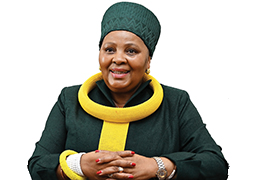
In the wake of the appointment of the former Speaker of the National Assembly (NA), Ms Thandi Modise, as a Minister of Defence and Military Veterans, the position of the Speaker became vacant. A sitting of the NA was convened yesterday to elect the new Speaker.
Two nominations emerged, one from the majority party, the African National Congress (ANC), Ms Nosiviwe Mapisa-Nqakula, and another one from the official opposition, the Democratic Alliance (DA), Dr Annelie Lotriet.
This necessitated a secret ballot as stipulated in item 6 (A) of Schedule 3 of the Constitution. After voting, Ms Nosiviwe Mapisa-Nqakula emerged victorious with 199 votes out of 298 votes.
In her acceptance remarks, Ms Mapisa-Nqakula stated that she was humbled by the confidence shown in her by her party, the ANC. She said an open voting process has once again demonstrated the open and democratic nature and vibrancy of our democratic order. “It’s this open and democratic process upon which our parliamentary democracy was founded,” she claimed.
She vowed that she would ensure that Parliament’s mandate would not be comprised for narrow party political ends. “I will ensure that Parliament remains the last line of defence of our democracy.” She assured the South African public that she recognises the need on her part to make a swift transition to ensure “I make it my responsibility to ensure that Parliament exercises robust accountability and oversight over the executive”.
In her view, her process of nomination and election in a women’s month is poignant exemplar of our country’s confidence in women capabilities to lead and to continue to eradicate patriarchy in decision making echelons in both private and public sectors.
She unequivocally stated that her task is well cut, as well as the circumstances that have been brought to bear by Covid-19 on how Parliament is, and should function going forward. “It’s important to find new ways of carrying our mandate under these new and challenging circumstances,” she emphasised.
Ms Mapisa-Nqakula reiterated her pledge: “I will do all in my power to protect the mandate and integrity of this House.” Most significantly, she concluded: “I will use my tenure to forge greater cooperation among all political parties present in this House and as its leader, I am committed fully to the provisions and the tenets of the prescripts of its founding document which is our Constitution.”
The Speaker of the National Assembly (NA) is elected to and removed from office according to Section 52 of the Constitution. According to this section the:
- The NA must elect the Speaker from its members during the first House sitting
- The House may remove the Speaker by resolution
- The House must fill the position when it becomes vacant during term
- Chief Justice must preside over the election of the Speaker
The mandate of the Speaker
The Speaker’s mandate is twofold. It is constitutional and institutional. This mandate is furthermore dual at the NA and Parliamentary level. In both situations, it involves interacting with the following sectors of the global community:
- International
- Continental
- Regional
- National
Constitutional Mandate
Section 90 (1)(d) of the Constitution provides that in the event of the unavailability of the President, the Speaker of the NA must act as the President until the NA designates one of its other members. Section 90 generally provides for the appointment of the Acting President but Sub-section (d) is the only one that goes on to say “until the NA designates one of its other members”.
The section can be interpreted to mean that the Speaker is the only one who must act when the post of the President is vacant. Further, the use of the phrase “its other members” means that the person occupying the position of the Speaker cannot be designated as the President. It therefore makes sense that the Constitution dictates that this person as somebody who has no interest in this position therefore objective must act as the President.
The Speaker is the leader of the NA. The NA has authority to legislate on behalf of the state including amending the Constitution, entering into bilateral agreements, treaties and signing international Human Rights Instruments. As a leader of the House, the Speaker has to ensure that these processes are in accordance with the Constitution.
The Speaker has to ensure that the members of the public participate in legislation making. The Speaker also must ensure that the House oversees and monitors the performance of the executive arm for effective implementation of legislation already passed by the House. The Speaker provides leadership to NA the House that has constitutional standing:
- To call upon its members to vote on any bill irrespective of where they from in the country
- To elect The President from the National Assembly
- From which The President appoints the Deputy President
- From which The President appoints the Cabinet Members
- That can remove the President from office
- To be consulted by the President before appointing Judicial Officers
Institutional Mandate
As the leader of the House, the Speaker has the responsibility to:
- Provide political leadership & strategic direction to the House
- Exercise impartiality at all times in pursuance of these duties
The impartiality of the Speaker is one of the prime values the integrity of South African Parliament is measured in terms of. The Speaker therefore has the responsibility of:
- Being the custodian of this integrity
- Preserving parliamentary integrity
- The decorum of the members of the House consequently.
- Serving as the Executive Authority for the House
- Ensuring the smooth running of the House business and its committees.
- Ensuring the development and management of the House programme
- Impartially presides over house meetings & maintaining order; and chairs the strategic parliamentary committee
- Together with the NCOP Chairperson jointly presiding over joint sittings of Parliament.
By Abel Mputing
19 August 2021

